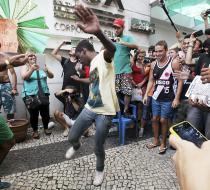Rolezinho Favorite
This description is taken from an article posted on dissidentvoice.org (link below):
Since last December, Brazilian shopping malls have become the stage for a new style of youth gathering: the rolezinho. Roughly translated as “little excursions” or outings, the rolezinhos can be characterized as planned meetings (via social network) of a large group of youth from poor neighborhoods, with the intent of seeing each other, flirting, eating and drinking at McDonald’s, taking pictures to post on Facebook, and simply having fun.
This can be considered a collective action with direct links to at least two different issues that characterize contemporary Brazilian society. First, rolezinhos cannot be understood without taking into account the almost nonexistence of public spaces for leisure and enjoyment. Coupled with the historic negligence of the Brazilian state to the population’s right to recreation, the ongoing privatization and destruction of the few existent public spaces of the kind leads to the curious situation in which a shopping mall and, particularly, its food court and parking lot, become a place for hundreds of young people to hang out. Second, the country’s economic growth in the last decade, with its emphasis on consumption, dramatically changed the social landscape, reinforcing the notion that in order to be someone, one needs to possess material goods, more specifically, branded merchandise. This last element is emphasized by the musical genre known as “ostentatious funk” and embraced by young Brazilians living in the periphery of big cities, particularly in São Paulo (many of whom take part in the rolezinhos). Commonly framed as the more acceptable version of the Brazilian funk genre, the lyrics of “ostentatious funk” as well as the video-clips produced by the MCs, cultivate a mode of life which places value on consumption. Wearing certain brands of clothing, driving certain cars, drinking certain liquors would altogether provide status, access to women and, most importantly, entrance into a differentiated social group.
In this context, there is nothing uncommon about young people from the outskirts of one of the richest (and most unequal) Brazilian cities deciding to hang out in the shopping malls. Besides associating this particular mode of consumption with social status, the teenagers taking part in the rolezinho do not want to be locked up at home in on the weekends, as pointed out by one of the organizers.3 Uncommon, nonetheless, is the effect such an action causes when they choose to do it collectively in large groups. The first rolezinho brought together no less than six thousands teenagers to a mall on December 7 in Itaquera, on the outskirts of São Paulo.
The rolezinhos constitute the moment when black and brown teenagers decide to collectively occupy sanitized and disciplined spaces of consumption – a consumption which in the first place was not meant for them – in order to make of it a locus of enjoyment and fun in their own terms – a form of leisure, linked to a lifestyle much celebrated by “ostentatious funk”, so far segregated and misrecognized. By doing so, they disrupt those very norms, putting into question the police order and exposing the great fallacy of the myth of racial democracy. And this disruption causes fear and hatred. They are bodies occupying spaces and reclaiming a form of citizenship which was not meant for them.






